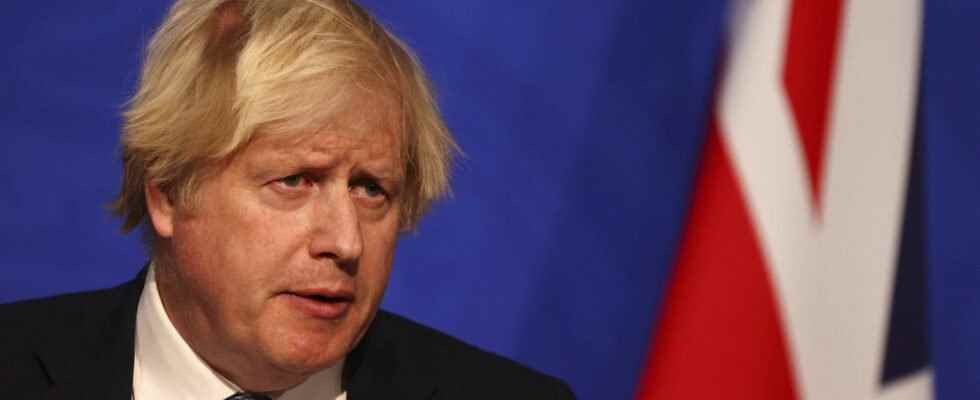OMICRON. Omicron made his first official death in the UK, Boris Johnson announced Monday, December 13, 2021, as the international community panics as more studies suggest two doses of the Covid vaccine are insufficient to counter the variant.
[Mis à jour le 13 décembre à 15h27] British Prime Minister Boris Johnson has just announced, this Monday, December 13, that a first positive death for the Omicron variant has been officially identified on his territory. A few hours earlier, the United Kingdom raised its Covid alert level: from three until then, it had dropped to four, the second highest level. The government had questioned the “rapid increase” in cases of the Omicron variant: “the transmission is high and the pressure on the health services is generalized and important or increasing”, he further explained. Indeed, Sunday, December 12, some 3,137 cases of Omicron were officially counted in the country, or 65% more than the day before, Saturday, December 11. Boris Johnson then alerted the population: “An Omicron tidal wave is coming”. In this context, the tenant of 10 Downing Street had announced a strong acceleration of the vaccine booster campaign, with the objective of having inoculated a third dose of vaccine against Covid-19 to all adults in the territory, by the end of December.
For its part, the World Health Organization (WHO) indicated in a technical update published this Sunday, December 12, that Omicron could spread faster than the Delta variant. In detail, the United Nations agency specified that it was “likely that Omicron will surpass Delta in places where there is community transmission”, eventually. A rapid diffusion observed in South Africa, where the Delta variant was less predominant, but also in the United Kingdom, where Delta dominates. At this time, the WHO does not yet know whether this high diffusion rate in populations with high immunity is due to the fact that Omicron “escapes immunity, benefits from an inherent higher transmissibility or if it is ‘is a combination of the two “. In addition, the B.1.1.529 variant also appears to cause less severe symptoms, classified as “mild to moderate” by the agency. The organization further speculated that the numerous mutations in Omicron suggested a “decline in vaccine efficacy” in terms of protection against “infection and transmission”. The WHO finally indicated that Omicron was now officially present in 63 countries, a figure probably underestimated, data on the variant remaining incomplete.
A new vaccine needed?
On December 3, on Franceinfo, the Minister of Health Olivier Véran indicated that pharmaceutical companies were working on a new vaccine in the event that studies prove that Omicron would resist those already authorized before adding that “this does not mean that there will be a fourth dose “. Thus, a new vaccine to fight against the Omicron variant could soon see the light of day. Faced with the Covid-19 epidemic which is resuming worldwide, Pfizer and BioNTech wish to market a vaccine suitable for the new variant “by March”, they said in a press release on Wednesday, December 9. If the current vaccine against the Covid-19 developed by the companies is “always effective” after “three doses”, studies carried out by the two companies show that the coronavirus variant is “probably not sufficiently neutralized after two doses”.
“We will continue to develop a vaccine specific to the Omicron variant and hope to make it available by March in case an adaptation is necessary,” the laboratories said in a statement. “A third dose provides a level of neutralizing antibodies against Omicron similar to that seen after two doses” for the other variants, they added.
The president of the Scientific Council, Jean-François Delfraissy, estimated, this Wednesday, December 8, in front of the Committee of Social Affairs of the Senate “that it is possible that we need at some time a fourth dose”.
“For now, it’s a recall, but maybe a fourth will be needed, I don’t know. I don’t know how long the recall will last. (…) In a crisis of this guy, we have to say everything we know, and put it on the table, so that we share what we know or don’t know. So it’s possible that we need to a given moment of a fourth dose, to remind, and in what time frame, I do not know it yet “, announced Jean-François Delfraissy.
WHO also shares the possibility of a fourth dose of vaccine to fight Covid-19 and its variants. For Sylvie Briand, director of the World Health Organization (WHO) for epidemic and pandemic risks, the need is “to know from when we have enough antibodies to be protected,” she told the micro LCI, December 8, adding that at present, she “does not know”. On the other hand, in the event of a fourth dose, it should be reserved for those who need it the most, “that is to say the most fragile and those who have difficulty in producing antibodies should, in any case, be careful. get vaccinated again, “she said. For the rest of the population, we have to “hope that a good immune system will keep its antibodies for longer.”
The results of a recent study, pre-published on the MedRxiv medical research site and conducted by South African researchers, demonstrate the ability of the Omicron variant to escape our immune system. The new variant would have a high capacity to re-infect individuals previously infected with Covid-19. This is the reverse phenomenon of the Beta and Delta variants, the risk of reinfection of which is lower. This study therefore demonstrates that the Omicron variant escapes the pattern known so far, in which a previous infection with SARS-CoV-2 allows a reduction of at least 80% in the risk of infection.
Thus, the Omicron variant would resist the antibodies developed by vaccination as we know it today. British Health Safety Agency has already specified that this variant exhibited a protein completely different from the strain of coronavirus on which current vaccines are based.
